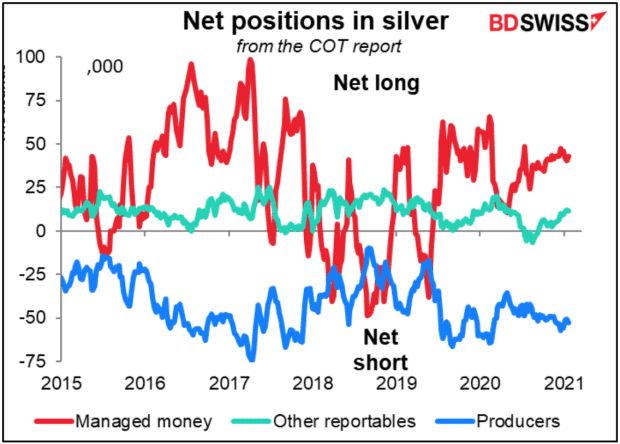Stock markets are rebounding from Wall Street’s worst week since October 2020, recouping losses caused in large part by a retail trading frenzy — but signs point to more turbulent days ahead.
Last week, investors based on the Reddit group WallStreetBets drove up the prices of shares in heavily-shorted companies, notably GameStop, forcing hedge funds to cover their shorts by selling big long bets. That, in turn, contributed to a selloff that saw major indexes slide.
But the rush isn’t over yet. Investors have a new focus: silver SILVER. Retail interest has pushed the precious metal up more than 11% on Monday since Friday’s close.
In our call of the day, Ipek Ozkardeskaya, a senior analyst at Swissquote Bank, said that silver’s rocketing rise may be more rational than some investors would have expected from an internet-based momentum play. But she also warned silver’s time in the sun may be short lived.
Along with causing a squeeze, the investment thesis espoused by the WallStreetBets crowd is that silver is undervalued because it is used extensively in high-tech applications like solar panels, which are positioned for long-term growth.
Plus: Miners surge as silver futures jump to eight-year high on retail interest
Ozkardeskaya said that there is some validity to being bullish on silver prices. The precious metal often trades in tandem with gold, which enjoyed a spectacular rally to all-time highs last year. Silver was largely left behind.
The gold-silver ratio, which describes the relationship between the two metals’ prices, historically converges near an average of 60 — meaning that the price of gold GOLD is often around 60 times higher than silver.

Silver is currently trading at just over $29 per ounce, but Ozkardeskaya said that it “could have well consolidated within the $30-32 band,” given the fact that gold prices held steady near $1800 per ounce.
“Therefore, the rise in silver doesn’t seem far-stretched just yet,” she said.
Also read: After 10 Years of Underperformance, Commodities Are Set to Boom. Here’s How to Play the Rally.
“So far, it is not exactly the GameStop anomaly, but it is a hint that the retail traders who just discovered the strength of their unity are out there, looking for new targets — and apparently bigger ones,” added the Swissquote Bank analyst.
“For silver though, the rally could be short-lived,” Ozkardeskaya said, noting that there is division among the posters on WallStreetBets, with some advising against betting on the rally. With the short squeeze on GameStop, there was near-unanimous support for that trade and overwhelming solidarity on the forum.
In fact, by Monday morning, there were numerous posts on the Reddit group alleging that the hype over silver was a ploy by hedge funds to galvanize retail investors’ energy and distract from the squeeze on GameStop shares.
“One important thing to remember in this game is, if you lose full support, and momentum, it is over,” Ozkardeskaya said. “The speculative rush is a prosperous, but a dangerous game.”
The buzz
The trading frenzy is expected to continue over videogames retailer GameStop GME and other heavily-shorted WallStreetBets favorites like cinema-theater chain AMC AMC, software group BlackBerry BB, and retailer Naked NAKD. AMC was the only stock of the bunch to rise after the open, and shares in GameStop have dived more than 30% so far in the trading day.
Trading app Robinhood has imposed buying limits on shares in all of these companies, though it has otherwise shortened its list of restricted stocks.
Melvin Capital, one of the main hedge funds with short positions targeted by WallStreetBets, lost 53% in January. It has now apparently “massively de-risked” its portfolio.
On the U.S. economic front, Markit’s manufacturing purchasing managers’ index for January was the first to come down the pipe: 59.2, up from 57.1 in December. The ISM manufacturing PMI came in at 58.7%, below the 60% expected and a fall from 60.7% in January.
Construction spending for December rose 1%, slightly ahead of expectations. Motor-vehicle sales figures for January are also due, as well as speeches from the presidents of the Minneapolis, Dallas, Atlanta, and Boston Feds.
The chief executives of Exxon Mobil XOM and Chevron CVX discussed merging the two companies last year, The Wall Street Journal reported on Sunday.
The Australian prime minister has suggested that software giant Microsoft’s MSFT Bing could replace Google’s search if it pulls out of the country. Google, owned by Alphabet GOOGL, has threatened to make its search engine unavailable in Australia over a proposed law that would make technology companies pay to circulate news content.
Outside of the markets, the world is waking up to news of a coup in Myanmar, where the head of government Aung San Suu Kyi and other politicians have been detained. The military said it was taking control of the country for a year.
The markets
Markets have moved to recalibrate after last week’s frenzy. Stock markets in the U.S. are charging higher SPX DJIA COMP. Asian markets rallied JP:NIK HK:HSI CN:SHCOMP while European markets marched further into the green XX:SXXP UK:UKX DX:DAX FR:PX1.
The chart

Our chart of the day, from Marshall Gittler at BDSwiss, shows just who is shorting silver — and he doesn’t really know who WallStreetBets is targeting. It is the silver producers who are short in the futures market, the analyst said, but it is normal for them to be short because they sell their production ahead to lock in prices.
Random reads
Naked mole rats have unique dialects and are “incredibly xenophobic,” according to a study.
Research finds singing in some languages could spread the coronavirus that causes COVID-19 more easily than others.
Need to Know starts early and is updated until the opening bell, but sign up here to get it delivered once to your email box. The emailed version will be sent out at about 7:30 a.m. Eastern.
Want more for the day ahead? Sign up for The Barron’s Daily, a morning briefing for investors, including exclusive commentary from Barron’s and MarketWatch writers.







